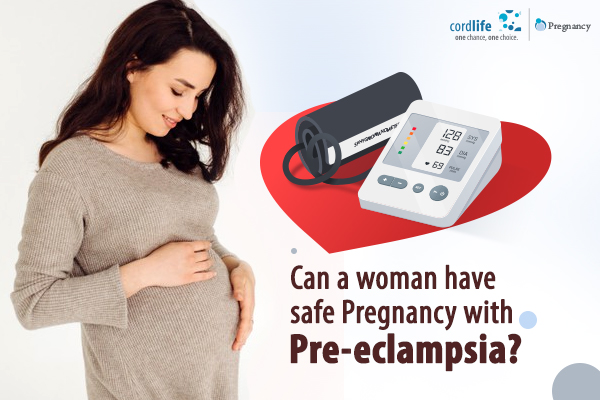Table of Contents
To see the baby bump growing with every passing month is a joy for a pregnant woman. But, is the feeling of happiness all for pregnancy? No!
During pregnancy, a woman has to feel equally healthy. And to further ascertain her health along with the health of the life growing inside her; she would have to take the doctor’s appointment, who will recommend her with many important tests to be done during her pregnancy journey.
Amongst these tests – Routine blood tests, test for Rh Factor, glucose screening is obviously required. But after the 20th week of pregnancy, when the doctor wants to examine a urine sample of a pregnant mother, the doctor tries to look for the signs of pregnancy-induced high blood pressure or pre-eclampsia in her. And pre-eclampsia during pregnancy should not be more than 130/80 mm Hg. It may otherwise lead to potential complications in her pregnancy and the unborn baby.
What Are The Causes and Risks Of Pre-eclampsia During Pregnancy?
This is a serious health condition during pregnancy, common to 2 to 8% pregnancies worldwide.
And as the experts believe, it starts with the placenta. It affects the arteries which carries the blood to the placenta (essential for providing the oxygen and nutrients to the growing baby and removes the waste materials from the baby) through the umbilical cord (umbilical cord blood). When the umbilical cord doesn’t have the blood in a sufficient amount; the blood, oxygen, and nutrient supply to the growing baby also gets compromised resulting in slow growth in the unborn baby (also known as foetal growth restriction) and low birth weight or pre-term birth.
But the placenta is not the only reason, as being plus-size or obese, being older than 35 years, having a history of hypertension in the family, first-time pregnancy, multiple pregnancy, in-vitro fertilization and pre-existing health conditions like migraines, and diabetes, are some of the factors which are equally responsible for pre-eclampsia during pregnancy.
How To Deal With Pre-eclampsia and Prevent It During Pregnancy?
However, if the condition receives appropriate treatment at an early stage, a woman with pre-eclampsia might have the chance of enjoying a healthy pregnancy and delivering a healthy baby, similar to a pregnant mother, who is not suffering from this condition.
It is important to not miss the doctor’s appointment throughout the pregnancy journey. The doctor will not just keep a close watch on the blood pressure by testing the protein content in the urine of the pregnant mother, but will also prescribe the pregnant woman the safest medicine, (at the most appropriate dose) to keep the pre-eclampsia under check.
Dietary guidelines in this condition play a major role. A well-balanced diet rich with high-fiber fruits and vegetables, low-fat protein, magnesium, and dairy products is a must, keeping the calorie intake in mind (not more than 300 to 500 calories extra). Additionally, keeping the salt intake low in food and including prenatal vitamins and calcium supplements in the diet is highly recommended.
Moderate activity along with yoga and meditation on a daily basis is a necessity to keep a watch on the weight and the stress levels of the pregnant lady.
To Conclude
While the medical fraternity has included the above-mentioned ways to deal with the condition and prevent it, however the only way to deal with the situation is the delivery of the baby. And in many cases, C-section or vaginal delivery is necessitated.
Being a mother is after all an iconic phase in a woman’s life. Let not conditions like pre-eclampsia damper the emotion. Let the pregnancy be safe and joyful.
